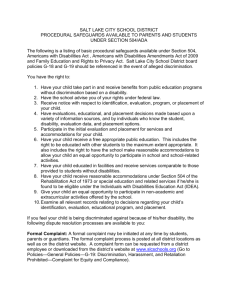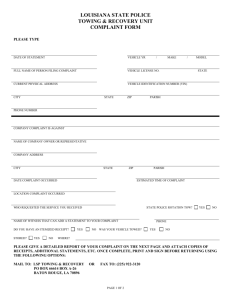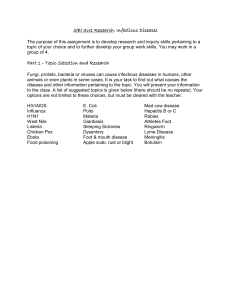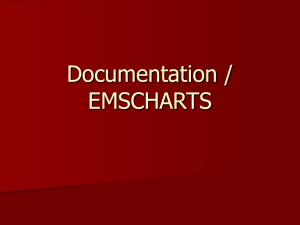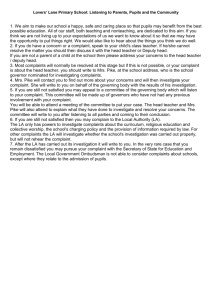Text (accessible) 29KB - Anti
advertisement
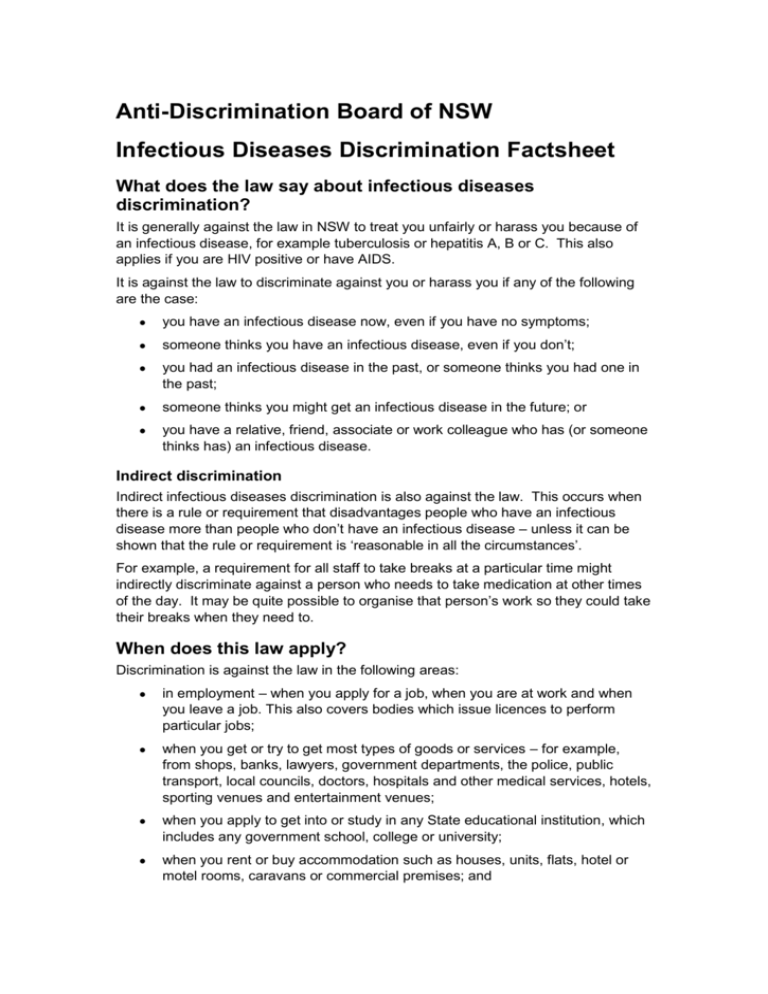
Anti-Discrimination Board of NSW Infectious Diseases Discrimination Factsheet What does the law say about infectious diseases discrimination? It is generally against the law in NSW to treat you unfairly or harass you because of an infectious disease, for example tuberculosis or hepatitis A, B or C. This also applies if you are HIV positive or have AIDS. It is against the law to discriminate against you or harass you if any of the following are the case: you have an infectious disease now, even if you have no symptoms; someone thinks you have an infectious disease, even if you don’t; you had an infectious disease in the past, or someone thinks you had one in the past; someone thinks you might get an infectious disease in the future; or you have a relative, friend, associate or work colleague who has (or someone thinks has) an infectious disease. Indirect discrimination Indirect infectious diseases discrimination is also against the law. This occurs when there is a rule or requirement that disadvantages people who have an infectious disease more than people who don’t have an infectious disease – unless it can be shown that the rule or requirement is ‘reasonable in all the circumstances’. For example, a requirement for all staff to take breaks at a particular time might indirectly discriminate against a person who needs to take medication at other times of the day. It may be quite possible to organise that person’s work so they could take their breaks when they need to. When does this law apply? Discrimination is against the law in the following areas: in employment – when you apply for a job, when you are at work and when you leave a job. This also covers bodies which issue licences to perform particular jobs; when you get or try to get most types of goods or services – for example, from shops, banks, lawyers, government departments, the police, public transport, local councils, doctors, hospitals and other medical services, hotels, sporting venues and entertainment venues; when you apply to get into or study in any State educational institution, which includes any government school, college or university; when you rent or buy accommodation such as houses, units, flats, hotel or motel rooms, caravans or commercial premises; and when you try to enter or join a registered club, or when you get services from one. A registered club is a club that sells alcohol or has gambling machines. Special facilities If you can do the essential parts of your job, employers must also provide any special facilities you need to do your job – unless it would cause them ‘unjustifiable hardship’ to do so. For example, you might need to have your breaks at particular times to take medication as previously, or work partly from home. Similar rules apply to educational institutions, accommodation providers and registered clubs. In deciding whether providing you with what you need would cause unjustifiable hardship, the organisation involved must consider the benefits of the proposed facilities to their other staff and clients, as well as to you. For more information, refer to our website and select ‘Anti-discrimination law’ then ‘disability discrimination’, ask for our factsheet Disability discrimination, or phone our Enquiry Service. Infectious diseases and privacy laws If an employer, workmate or service, accommodation or education provider tells anyone else about your infectious disease when you haven’t said they can, this could lead to discrimination that is against the law. It may also be against privacy laws. For more information on privacy laws contact Privacy NSW on (02) 9229 8585, or refer to their website at www.lawlink.nsw.gov.au/privacynsw. However, some infectious diseases are classified as ‘notifiable’. This means that a health care practitioner may have to notify a Public Health Unit about your infectious disease. For more information, contact your local Public Health Unit. Public health and safety exceptions An employer or service provider is allowed to discriminate against you if another law tells them that they must. For example: They may have to discriminate against you because of public health or occupational health and safety laws. For example, you are not allowed to handle food when you are in the acute stage of many infectious diseases such as hepatitis A, and you may not be able to do certain specialised medical work if you have hepatitis C. For more information, contact your local Public Health Unit. If there is an outbreak of an infectious disease (such as whooping cough or measles) in a day care centre, pre-school, or primary school, the organisation’s director or principal can be instructed by the Public Health Unit to exclude a child who is not immunised until the outbreak is over. However, there are only rare occasions when health and safety obligations mean that someone can discriminate against you because you have an infectious disease. This means that it is generally against the law to: refuse to hire you or provide you with a service, accommodation or education; make you have a blood test; segregate you from other staff or clients; dismiss you from your job; breach your confidentiality or privacy on the grounds that others have the right to know about your disease; treat you unfairly because they think you use drugs or you are gay, and therefore assume that you have an infectious disease. HIV/AIDS vilification HIV/AIDS vilification is also against the anti-discrimination law. Vilification is defined as any public act that could encourage hatred, serious contempt, or severe ridicule towards people who have HIV/AIDS. Public acts could include remarks in a newspaper or journal, in other publications, on radio or television or on the internet, including social networking sites. They could also include graffiti, posters, verbal abuse, speeches or statements, gestures and badges or clothing with slogans on them, as long as these are displayed, made or worn in public. The vilification law does not cover acts that are not public, for example abuse over a back fence that no-one else can hear. For more information about this part of the law, refer to our website and select ‘Antidiscrimination law’, ask for our factsheet Vilification, or contact the Anti-Discrimination Board’s Enquiry Service. Homosexual and carer’s responsibilities discrimination If you are HIV positive or have AIDS and someone treats you unfairly or harasses you because you are homosexual or they think you are homosexual, this could be against the law. It could also be against the law if you are treated unfairly or harassed at work because you are caring for or supporting a child or family member with an infectious disease. For more information, refer to our website and select ‘Anti-discrimination law’, or ask for our factsheets Homosexual discrimination and Carer’s responsibilities discrimination. What can I do if I’m treated unfairly or harassed because of an infectious disease? First you need to work out if what has happened to you seems to be against the law. If you are not sure after reading this factsheet, phone our Enquiry Service for more information. If what’s happened to you does seem to be against the law, you should try talking to the person or organisation involved. The organisation may have a policy on these issues or a process in place to deal with grievances, and you may be able to address your problem through these channels. You can also get help from other sources such as trade unions. If you don’t feel able to talk to the person or organisation, or you talk to them but it doesn’t solve the problem, you can make a complaint to the Anti-Discrimination Board. It won’t cost anything to make a complaint, and you don’t need a lawyer. If what has happened to you is not against the law, there may be other ways you can solve the problem. Refer to our factsheet How to deal with discrimination, unfair treatment or harassment or phone our Enquiry Service for advice. Making a complaint Your complaint must be in writing. You can make a complaint by completing our discrimination complaint form, which is available on our website or from our Enquiry Service. Another option is to write to the President of the Anti-Discrimination Board, explaining what happened and why you think you have been discriminated against because you (or your relative, friend, work colleague or associate) have an infectious disease. Our addresses and phone numbers are at the end of this factsheet. You can write to us in any language, or in Braille, and we will have your complaint translated free of charge. If you need assistance to write your complaint down, phone us and we will help you or refer you to somewhere else for help. We also accept complaints on your behalf by organisations such as trade unions and other representative bodies (for example an AIDS support organisation). In this case you must be named in the complaint and it must be clear in the complaint that you agree with it being made. You may also be asked to show that you consent to the complaint being made on your behalf. If you want to make a complaint on behalf of a child or a person with a disability who cannot make their own complaint, contact us for more information. The Board can only accept a complaint if the discrimination or harassment occurred in the twelve months before we receive the complaint. If you make a complaint about events that occurred more than twelve months before we receive it, we may not investigate the complaint. If your problem is urgent (for example you are about to lose your job or housing), make this clear in your complaint and we will try to help you quickly. What happens after you make a complaint? We will generally investigate your complaint to make sure that what has happened to you is against the law. If this is the case, we will try to conciliate your complaint. This means we will try to help you and the person or organisation you are complaining about to reach a private settlement that you both agree on. The Board is impartial in this process and does not take sides. The settlement will depend on the circumstances of your case, on what the other parties are willing to offer and what you are willing to accept. It could be an apology, financial compensation, getting your job back, better arrangements at work, getting the service you were denied, and so on. We treat all complaints confidentially, but we have to inform the organisation or person you are complaining about of the complaint. This is so we can give them a fair chance to respond to your complaint. We will not release information about your complaint to anyone else except with your permission or if we are required to by law. Most complaints are conciliated. If yours isn’t, you may go to the Equal Opportunity Division of the Administrative Decisions Tribunal, which is like a court. It provides a legal judgment that must be followed. Very few cases need to go to the Tribunal and in some circumstances you can ask for your details to be kept confidential. Victimisation is also against the law It is against the law for anyone to hassle or victimise you or treat you unfairly because: you have complained to your employer or another person about infectious diseases discrimination; you have complained to the Anti-Discrimination Board; or you have supported someone with an infectious diseases discrimination complaint, or acted as a witness in an infectious diseases discrimination case. You can lodge a separate complaint of victimisation with the Anti-Discrimination Board if you have been victimised because of a complaint relating to infectious diseases discrimination. Examples of infectious diseases discrimination complaints we have handled 1. A man complained to the Board that he was forced to resign from his job after he told a supervisor about his hepatitis C status. The supervisor told all the other employees, and he had to have a blood test. Following conciliation, he received financial compensation for lost wages and hurt and humiliation, and the organisation agreed to change its work policies and practices. 2. A man complained to the Board that he had been refused surgery at a private hospital when they found out that he was HIV positive. The hospital claimed that their facilities weren’t equipped to cope with someone with HIV. The complaint was settled when the hospital paid the man compensation, gave him a written apology and agreed to change their policy so that the problem would not happen again. 3. A cook in a canteen, suspected of being homosexual and of having AIDS, was asked to leave the workplace because his presence was “upsetting other staff”. In conciliation, the employer agreed to give him his job back, and to run workplace education of employees about the transmission of HIV and AIDS, and HIV and AIDS-related discrimination. 4. A woman went for a medical test to work with a large government agency, and tested positive for Hepatitis C. She told the agency and they allowed her to begin training while further tests were done. These revealed that she was infectious, and the agency refused her admission to the next stage of training. After she lodged a complaint, the agency said they were not prepared to change their decision, but would assist her to find a position in a related area where her medical condition would not be an issue. For more detailed information on making a complaint and the complaint process refer to our website and select ‘Making a complaint’, or ask for our factsheet on Complaining to the Anti-Discrimination Board. The Anti-Discrimination Board of NSW Enquiries Phone (02) 9268 5544 Toll free number 1800 670 812 (if you are calling from outside Sydney) TTY (02) 9268 5522 Email: adbcontact@agd.nsw.gov.au Complaints Phone (02) 9268 5544 Toll free number 1800 670 812 (if you are calling from outside Sydney) TTY (02) 9268 5522 Email: complaintsadb@agd.nsw.gov.au Telephone interpreter service Phone 13 14 50 Website antidiscrimination.justice.nsw.gov.au Sydney Level 4, 175 Castlereagh Street, Sydney NSW 2000 PO Box A2122, Sydney South NSW 1235 Phone (02) 9268 5555 Fax (02) 9268 5500 TTY (02) 9268 5522 Wollongong 84 Crown Street, Wollongong NSW 2500 PO Box 67, Wollongong NSW 2520 Phone (02) 4267 6200 Fax (02) 4267 6261 TTY (02) 4267 6267 Newcastle Level 3, 97 Scott Street, Newcastle NSW 2300 PO Box 1077, Newcastle NSW 2300 Phone (02) 4903 5300 Fax (02) 4903 5376 TTY (02) 4903 5389 Revised March 2011

